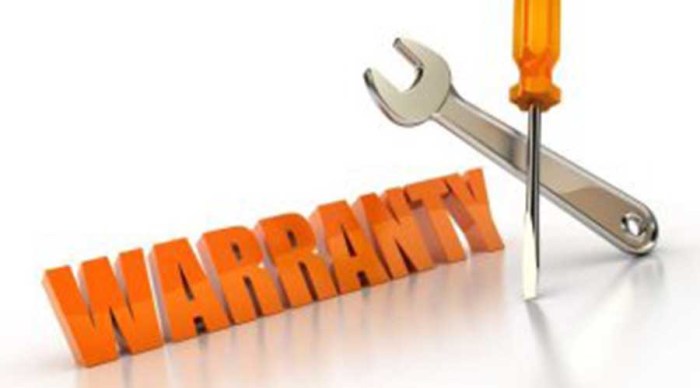When it comes to vehicle warranties, navigating the different types and understanding their importance can be a game-changer for car owners. Buckle up as we explore the ins and outs of vehicle warranties with a fresh and engaging perspective.
From powertrain warranties to the claim process, we’ve got you covered with all you need to know to make informed decisions about protecting your ride.
Types of Vehicle Warranties

When purchasing a vehicle, it’s crucial to understand the different types of warranties available to protect your investment. Let’s delve into the various options and their coverage to help you make an informed decision.
Powertrain Warranty
A powertrain warranty typically covers the components that make the vehicle move, such as the engine, transmission, and drivetrain. This type of warranty is essential for ensuring that your vehicle’s essential parts are protected against defects and failures.
Bumper-to-Bumper Warranty
On the other hand, a bumper-to-bumper warranty, also known as a comprehensive warranty, covers almost all components of the vehicle, excluding only wear-and-tear items like tires and brakes. This type of warranty provides more extensive coverage but may come with a higher price tag.
Extended Warranty
An extended warranty, as the name suggests, extends the coverage of the manufacturer’s warranty beyond the standard period. This can be beneficial for those looking for long-term protection and peace of mind. However, it’s essential to carefully review the terms and conditions of an extended warranty to understand what is and isn’t covered.
By evaluating the coverage and limitations of each type of warranty, you can choose the one that best suits your needs and budget. Whether you prioritize comprehensive coverage with a bumper-to-bumper warranty or prefer the cost-effectiveness of a powertrain warranty, selecting the right warranty can provide you with added security and assurance for your vehicle.
Importance of Vehicle Warranties
Having a vehicle warranty is crucial for car owners to protect themselves from unexpected repair costs and ensure peace of mind while driving. Let’s explore why vehicle warranties are essential.
Save Money on Repairs and Maintenance
Vehicle warranties can save car owners a significant amount of money on repairs and maintenance. Instead of having to pay out of pocket for costly repairs, warranty coverage can help offset these expenses. For example, if your car’s transmission suddenly fails, having a warranty can cover the cost of the repair, which could potentially save you thousands of dollars.
Peace of Mind for Car Owners
One of the biggest benefits of having a vehicle warranty is the peace of mind it provides to car owners. Knowing that your car is protected in case of unexpected breakdowns or malfunctions can alleviate stress and worry while driving. Whether it’s a minor issue like a faulty air conditioning system or a major engine problem, having a warranty can give you the confidence to handle any situation that arises without breaking the bank.
Factors to Consider When Choosing a Vehicle Warranty

When selecting a vehicle warranty, there are several key factors to consider to ensure you are getting the best coverage for your needs and budget.
Coverage Options
- Consider the specific components of your vehicle that are covered under the warranty. Some warranties may only cover major components, while others offer more comprehensive coverage.
- Look for additional benefits such as roadside assistance, rental car reimbursement, and trip interruption coverage.
- Check if the warranty is transferable if you plan to sell the vehicle before the warranty expires.
Cost of the Warranty
- Compare the cost of different warranty options, taking into account the coverage provided and any deductibles that may apply.
- Avoid choosing the cheapest option without considering the level of coverage, as it may end up costing you more in the long run.
- Consider the value of the warranty based on the likelihood of needing repairs and the potential cost of those repairs without coverage.
Reputation of the Warranty Provider
- Research the reputation of the warranty provider to ensure they have a history of honoring claims and providing excellent customer service.
- Read reviews from other customers to get an idea of the overall satisfaction with the warranty provider.
- Avoid companies with a high number of complaints or negative feedback regarding claim denials or delays.
Importance of Reading the Fine Print
It is crucial to read the fine print of a vehicle warranty to understand the terms and conditions of coverage fully. The fine print may include details on exclusions, limitations, and requirements for filing a claim. Failure to understand the fine print could lead to unexpected expenses or claim denials.
Tips for Evaluating and Comparing Warranties
- Request quotes from multiple warranty providers and compare the coverage options and costs side by side.
- Consider the length of the warranty and whether it aligns with your ownership plans for the vehicle.
- Ask questions about anything you don’t understand in the warranty contract before signing up.
- Consult with a trusted mechanic or dealership to get their recommendations on reputable warranty providers.
Claim Process for Vehicle Warranties
When it comes to filing a claim under a vehicle warranty, there are specific steps that need to be followed to ensure a smooth process. Understanding what documentation is required and knowing common reasons why warranty claims may be denied can help you navigate this process effectively.
Steps Involved in Filing a Claim, Vehicle warranties
- Contact the warranty provider: Notify the warranty provider about the issue with your vehicle and inquire about the claim process.
- Schedule an inspection: The warranty provider may require an inspection of the vehicle by an authorized mechanic to assess the issue.
- Submit documentation: Prepare and submit all necessary documentation, including the warranty contract, service records, and proof of maintenance.
- Wait for approval: Once the documentation is submitted, wait for the warranty provider to approve or deny the claim.
- Authorize repairs: If the claim is approved, authorize the repairs to be completed by an authorized repair facility.
- Pay deductible: Depending on the warranty terms, you may need to pay a deductible for the repairs.
Documentation Required for Making a Warranty Claim
- Warranty contract: Copy of the warranty contract showing coverage details.
- Service records: Documentation of regular maintenance and service performed on the vehicle.
- Proof of ownership: Title or registration documents to prove ownership of the vehicle.
- Repair estimates: Estimates from authorized repair facilities for the cost of repairs.
- Diagnostic reports: Reports from inspections or diagnostic tests performed on the vehicle.
Common Reasons for Claim Denial and How to Avoid Rejection
- Lack of maintenance: Failure to maintain the vehicle according to the manufacturer’s recommendations can lead to claim denial. Ensure you follow the recommended maintenance schedule.
- Pre-existing conditions: Claims for issues that existed before the warranty coverage started may be denied. Make sure to disclose any pre-existing conditions when purchasing the warranty.
- Unauthorized repairs: Getting repairs done at unauthorized facilities or without prior approval can result in claim denial. Always seek authorization before proceeding with repairs.
- Expired warranty: Attempting to file a claim after the warranty period has expired will lead to denial. Keep track of your warranty expiration date.